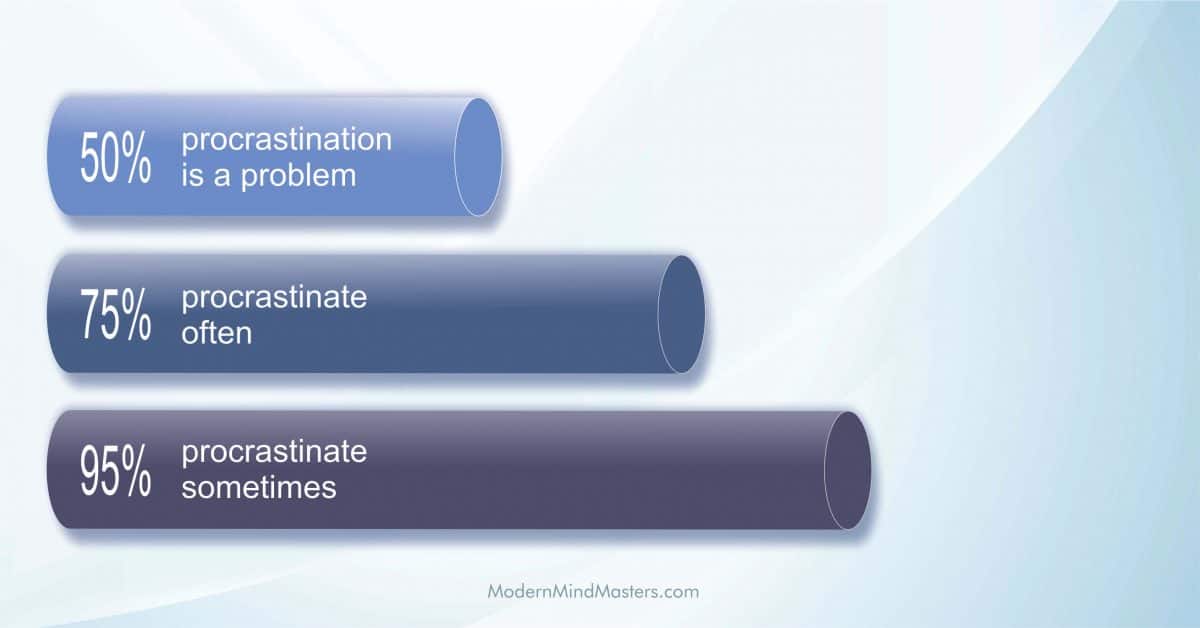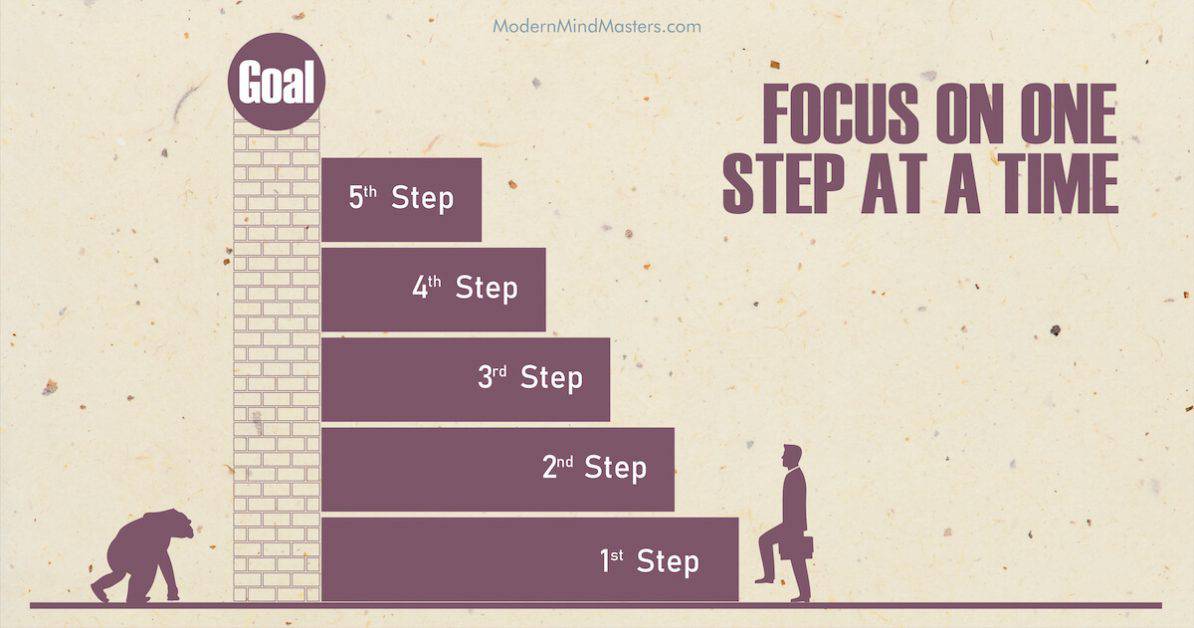How To Stop Procrastinating – 7 Science-Based Steps
Key Points:
- Our Homo sapien brains are wired for short-term thinking, but many modern problems require long-term planning.
- Procrastination is caused by two types of anxiety: mastery- and performance-orientated.
- Use habits, routines, goals, small wins, and dopamine peaks to stave off procrastination.

Jump to:
The scale of the universe is almost impossible to imagine for our limited 3-dimensional brains. All the particles we could ever see and touch – baryonic matter – make up just 5% of the mass of the universe. The remaining 95% appears to be made of two mysterious, invisible substances: dark matter and dark energy.
Procrastination is the earthbound equivalent of dark energy. We can’t see, feel, or touch it, and we don’t fully understand exactly why it appears, but we can measure its effects and become aware of its presence.
Like dark energy, procrastination is a universal force that affects everyone, even the most successful. Bill Clinton was infamous for his poor time management skills, which led Time magazine to publish an article on his apparent laziness while still in power. Even Al Gore, his Vice President, proclaimed that he was “punctually challenged”.
It is not just a human problem either; studies of behavioral patterns of pigeons and rats have shown a tendency to choose a complex but delayed task over a simple and immediate one.
This article will cover everything you need to know about the causes and effects of your procrastination habits, including seven powerful exercises you can apply today to counter its detrimental effects.
What is Procrastination?
Procrastination is the action of unnecessarily and voluntarily delaying or postponing an important task despite knowing that there will be negative consequences for doing so.
It seems crazy, right? Why would a rational and intelligent being delay what they know could be done now to a point in the future where time is no longer on their side? Rushed and flustered, stress and anxiety are likely to arise, causing us to feel overwhelmed.
Despite seeming irrational, there are clear evolutionary reasonings behind your procrastination. And it affects everyone to some degree; some just deal with it better.
It is critical to clarify that delaying a task is not deemed as procrastinatory if there are rational reasons behind it. If you want to postpone a task, to when you have better information or can better concentrate, this delay can be considered strategic, not procrastinatory.
How Big is the Problem?
Studies show that approximately 80%–95% of college students engage in procrastination to some degree. 75% consider themselves to be procrastinators, while 50% say that they procrastinate in a consistent and problematic manner.
In his 2010 book, The Procrastination Equation: How To Stop Putting Things Off and Start Getting Things Done, Dr. Steel says surveys reveal that about 95% of people admit to procrastinating at least some of the time.
In the 1970s, surveys indicated that only 5% of the population felt they belonged in this chronic category, says Dr. Steel. Today, that figure has risen to about 20%, showing that either people are more aware of their procrastination, or modern environments have made it more likely.

Effects of Procrastinating
We all know we procrastinate to some degree, but identifying when it starts taking over is more challenging. Here are the five most common symptoms to look out for when dealing with procrastination.
1) Avoidance
The easiest way to procrastinate is to skirt a task altogether. Avoiding the location or situation where it takes place is the easiest means of delay, such as laying in bed to avoid sitting down in front of the computer to start work.
If you struggle to get out of bed or off the sofa, you are likely subconsciously dodging a task. When you find yourself procrastinating, try to at least place yourself in the environment you’re supposed to be in, such as sitting at your desk or driving to the gym.
2) Denial
Deniers have good intentions; they sit down to knock off their to-do list, but instead of prioritizing according to importance, they perform tasks that are easy or quick to perform. They avoid the priority task but convince themselves they are still being productive.
For example, you may know you need to write an essay, but you prioritize washing your clothes, grocery shopping, or completing less meaningful work first. While still doing something useful, deniers procrastinate on their most important task and fail to take responsibility for their priorities.
3) Distraction
Distraction is the most likely cause of the increasing trend of procrastination. In today’s age of abundant technology and social media, purposely designed to be addictive and hold our attention for as long as possible, infinite sources of diversion are never more than a few meters away.
Engaging in other behaviors or actions to prevent awareness of a task becomes a subconscious reflex. The more we distract ourselves, like reading messages and notifications the second we receive them, the more we ingrain the reflexive habit of becoming distracted.
4) Blaming
Sometimes we blame external factors for our tendency to procrastinate, such as not feeling the gym today, or only having one hour to sit down and write.
You may be too tired to write a chapter of your novel, but you could at least plan a rough draft, or maybe do some research. Perhaps you injured your foot and cannot run at the gym, but you could at least have a quick arm workout.
Excuses are infinite, and if you allow yourself to succumb to them, they will habitually dominate your decision-making. Learn to accept responsibility for your thoughts and identify when they start driving your actions.
5) Comparisons
When we fail to hold ourselves to higher standards, we resort to lowering our performance to those who perform worse.
Instead of accepting responsibility for failing to hit the gym in the morning, we might attempt to feel better by comparing ourselves against those who don’t exercise at all. When we fail to raise our standards, our default is to lower those around us.
Look out for when you’re settling to lower standards to comfort your procrastinatory cravings, and consciously fight them to maintain your higher standard.
Procrastination Leads to More Procrastination
The more you delay, the more likely you will suffer from health problems such as stress, anxiety, guilt, and social disapproval. Together, these feelings have been shown to promote further procrastination, leading to chronic issues for some.
To make matters worse, such procrastinators may have trouble seeking help due to social stigmas and the belief that task aversion results from a lack of willpower, self-control, or laziness.
From here starts a vicious cycle that can lead to severe psychological issues, including depression. These people must seek professional help to make progress. Be aware that procrastination can become a habit if you allow it.
What Causes Procrastinating?
Research has found a strong positive correlation between procrastination and agreement with the statement, “No matter how much I try, I still put things off”. This heavily suggests that procrastination is largely involuntary.
Knowing this, we can acknowledge that the causes of procrastination often lie in our subconscious habits and behaviors. We know procrastination is not logical, so the decision is unlikely to come from our conscious prefrontal cortexes. Instead, it must stem somewhere deeper.
1) Limbic Urges for Immediate Gratification
Humans are short-term thinkers by nature. For most of Homo sapiens’ 200,000 years of history, we have only had to focus on acute stressors (short-term problems), such as foraging and finding shelter.
These acute stressors were solved quickly, such as relieving the stress of thirst by finding water or avoiding the dangers of a storm by seeking shelter.
Our dopamine system provides the energy and motivation to overcome the risks involved in these activities and to leave the safety of our comfort zones.
For example, dopamine (resulting from the anticipation of a tasty dinner) gave us a boost of motivation to hunt for food despite the possible dangers of infections from cuts and becoming prey ourselves.
Dopamine is excellent for short-term motivation because the reward usually follows quickly. It is more challenging to induce dopamine longer-term, however, because the energy required to sustain motivation over extended periods is significantly larger, whereas the reward is fixed.
Long-Term Problems are Difficult for Short-Term Brains
In some ways, we are a victim of our own success. We have the unique problem of living in a long-term environment with a short-term mentality.
Our brain has not been able to evolve as quickly as the demands of modern society, such as retirement planning or career progression. As a result, we have to deal with these essential long-term tasks with short-term mentalities, often causing limbic friction that manifests as procrastination.
2) Procrastination Becomes a Habit
To make matters worse, continued procrastination can easily and quickly become habitual.
Habits, by nature, are performed automatically, often without our conscious awareness. Good habits, therefore, are productive because they enable us to perform worthwhile tasks, such as reading, without having to use willpower to convince ourselves.
Bad habits, however, make it easier to perform unproductive activities, such as procrastinating on your phone, without even realizing it. The only thing worse than actively avoiding a task is not even realizing you’re doing it.
Once the procrastinatory habit has started, the more we reinforce it, the harder it becomes to reverse.
3) Task Aversiveness
Certain tasks will appear very taxing from a procrastinator’s outlook. And the more we think and worry about starting them, the more stress and anxiety we bury them in. Thus the longer we delay, the harder it becomes to start.
We know from experience that tasks that we perceive as boring or unpleasant are harder to begin. There are two prominent reasons why some tasks appear more difficult to attempt than others.
Mastery-Orientated Anxiety
Students from Western cultures have been found to procrastinate to avoid facing disappointment with themselves and their individual levels of skill and effort.
A 2008 meta-analysis across thirteen different societies revealed that students from Western cultures tend to be motivated more by a mastery-orientated approach because more value is placed upon individual achievement. Here, we are anxious about disappointing ourselves.
Performance-Orientated Anxiety
Students from non-Western cultures, however, tend to procrastinate to avoid looking inadequate in front of their peers.
These eastern cultures have been found to procrastinate due to performance-orientated anxiety, where they make efforts to maintain a positive image of their abilities in front of their peers.
Identify Your Task Aversiveness
While mastery- and performance-orientated anxieties are more likely to appear in Western and Eastern societies respectively, each task will have its own specific reasons for causing anxiety.
For any task you feel yourself procrastinating on, honestly evaluate whether it is for fear of disappointing yourself should you fail or whether disappointing others is driving your aversion. Be honest with yourself; both reasons are valid and familiar.
4) Perfectionism
Perfectionism is a prime cause for procrastinating because any task where anything short of perfection is considered inadequate will drive a greater task aversion to start it.
Perfection is not only rarely required, it is often not even realistically attainable. Unrealistic goals destroy self-esteem when not reached and lead to general unhappiness and lowered motivation.
These feelings worsen when our perfectionism is what psychologists describe as “socially prescribed”, where individuals believe that they must be perfect to receive approval from others.
The Perils of Perfectionism
Perfection is a whole other issue (see this article here on the perils of perfectionism). Excessive preoccupation with others’ opinions, and an inability to experience satisfaction even after a successful performance, are positively correlated with procrastination.
To overcome perfectionism-induced procrastination, it is essential to build a realistic and healthy view of failure, where we view it as a learning mechanism and not as a social evaluation.
Related article: The Failure Paradox – How Failure is Fundamental to Success
5) Genetics
There has been much debate about the role of genetics in those who are more likely to procrastinate. Measuring procrastination is challenging because it could be caused by many sources, such as goal theory and impulsiveness.
A famous study on identical twins found that procrastination has a perfect correlation (100%) with impulsivity (the inability to inhibit behavioral impulses and thoughts) at the genetic level.
At the phenotypic level (which includes environmental effects) 42% of the variation in procrastination is shared with impulsivity, suggesting that environmental effects have a greater effect on a person’s proclivity to procrastinate than genetics alone.
These results should be taken with a pinch of salt, however. A different study found that only 22% of the variance in procrastination is explained by genetic factors, and another study found that the genetic correlation between procrastination and impulsivity was only around 30%.
Despite the results, procrastination is likely only partially based on genetics, certainly not to a level that cannot be overcome with manual intervention.
How To Stop Procrastinating
There are no hard-and-fast rules to stop procrastinating. Still, there are some excellent starting points that will provide a foundation upon which you can begin to identify your principal sources of procrastination.
Not all of them may work for you because, as we have just seen, the specific source of task aversiveness will determine what course of action you should take to combat it.
Try them all, one or two at a time, to see which works best for you. After a few weeks, introduce another one and drop those that have the least effect.
Procrastination is a broad and complex problem, so trial and error is needed to find out more about yourself and your specific work preferences.
1) Awareness of Habits and Thoughts That Lead to Procrastinating
Habits are a blessing and a curse. When productive, they enable us to complete simple tasks without having to think much about them, such as washing the dishes straight after dinner. When destructive, they bypass conscious thought, such as biting your nails, making it tough to identify and stop.
Every habit has a trigger, something that kicks the memory of the habit and encourages your subconscious mind to engage. For smokers, it can be the smell of coffee that usually accompanies a cigarette. For procrastinators, it might be a message notification that leads to ten minutes of scrolling through Facebook.
Find the triggers that are causing your negative procrastinatory habits and change them. If it is your mobile phone, leave it in another room. If it is your partner or kids, allocate a time when you cannot be disturbed.
2) Convert Long-Term Goals to Short-Term Tasks
Setting and planning pragmatic goals will break your long-term needs into short-term tasks. We saw earlier that the brain is wired to complete short-term goals, such as foraging for food or shelter, that we can satisfy quickly to fulfill our dopaminergic cravings.
The more we can convert our long-term goals to short-term tasks, the easier our brains can tackle them. We are not changing the scope of the goal but simply reframing it in a way that the brain can better process it.
Instead of thinking about reading an entire book, focus on the 20 pages you need to read today. Instead of worrying about losing 10kg, concentrate on preparing a healthy dinner tonight.
It is much easier to think about eating one healthy meal tonight than to think about dieting over months. And if we could maintain this short-term way of thinking, we get the best of both worlds; we only have to think about it today (short-term), while the long-term effects will compound on their own.
The most daunting obstacle to productivity is not doing the work, but starting it. Like a boulder at the top of the mountain, getting it moving requires the most energy – gravity does the rest. So make the start point as small and effortless as possible. Momentum will soon take over.

3) Set Small Goals for Small Wins
Small wins generate the energy required to move a boulder, where momentum can take over to facilitate more significant wins. So set yourself tasks that enable you to achieve something productive to get the ball rolling.
Jordan Peterson’s bestselling book “12 Rules For Life” has a chapter dedicated to “cleaning your room”. While you may not think that cleaning your room is very ground-breaking, the value lies not in the result of a clean room, but in the dopamine released when you complete even basic tasks.
Completing small wins early in the day will allow you to ride the dopamine wave released from achieving them. If you are struggling to find the motivation to start work on your essay, clean your room, take out the trash, or do something else that is useful and easily achievable.
With elevated levels of dopamine in your system, you will have a greater motivation to attempt more significant tasks.
It may seem a small and trivial step, but the real value lies in what you are not doing. When making your bed, you are not wasting time looking through social media.
Instead of feeling guilty when procrastinating, you are distracted from it by being productive. Actions are only half of the intent of small goals – the mindset it produces is equally helpful.
Ensure that your small daily tasks and wins are realistic and meaningful, even if it is as simple as vacuuming.
4) Use Dopamine to Attach Your Effort to the Reward
Dopamine is a powerful tool for providing the motivation and energy to seek rewards. But the more we apply it to the same task, the less powerful it becomes.
When getting a new videogame, for example, the pleasure we receive from playing it might last a week or even a month, but eventually, it starts to wane and becomes less fun. The game didn’t change, but the more we play, the less dopamine we draw from it.
This is the problem with rewards; they become less valuable the more we indulge in them, as explained by Andrew Huberman in the video below:
Huberman also suggests that we shift our view of rewards away from material things, which become less rewarding the more they are achieved, toward the effort of the activity itself.
For example, applying the Pareto Principle to weightlifting in the gym, 80% of the work (breaking muscle fibers to build bigger and stronger ones) occurs in the last 20% of the set (the toughest reps).
We should consciously tell ourselves that this toughest 20% is where the most progress is made. This 20% is accelerating us toward achieving our goals. We should celebrate and reward ourselves when pushing in these productive zones.
We can apply this effort-reward mentality to all aspects of our lives. When arguing with a spouse, the height of a heated conversation can be the most important because you are conveying your opinion and (hopefully) listening to your partner. When you get through it, it was this argument that was necessary to move on.
Each time you subjectively and consciously tell yourself the reward is in the effort, you build/rewire neural pathways that strengthen the relationship between effort and dopamine.
This does not mean you should aggressively pursue pain; adrenaline junkies burn out quickly. But by consciously reminding yourself that the effort you are currently experiencing is progressing you closer to your goal, you start utilizing your dopamine system more productively.
If you are struggling to sit down and write, affirm to yourself that as long as you are writing, you are on the right path. Whatever your goal, the fact that you are currently on the right path to completing it, no matter how much effort it takes, should be rewarded via your dopamine system.
5) Use Self-Control to Eliminate Reflexive Distractions
I am as guilty of this as anyone reading this; mobile phones have become so ubiquitous in everyday life that we now reach for them reflexively without conscious processing.
Think about it, most of the time you pick your phone up, you have no active need to do so. You have no messages that need responding to now, no one is calling, and you don’t need to look anything up. You do it just because it is instinctive for you to do so.
Although you consciously reach for your phone, the fact that there was no immediate need to means that the impulse was reflexive and subconscious. If every time you do this you spend five minutes scrolling, and you do this ten times a day, that’s almost an hour of the day lost for no real reason. Better time management starts with the awareness of where your time is going.
Remember, all habits have triggers that initiate them, so find the triggers causing your bad habits. If you procrastinate on your phone, perhaps you need to keep it in another room when working. If noisy roommates keep distracting you, change your environment by working in a library.
6) Redefine Your View on Failure
Perfection does not exist in our pragmatic world. We all have unique strengths and weaknesses, and by acknowledging our weaknesses, we accept that mistakes are inevitable.
Successful businesses and entrepreneurs understand that execution – the art of getting things done – yields greater results than continually striving for perfection.
When we understand that perfection is not practical nor usually required, we can accept that our failures are not end-points, but opportunities to pivot toward a more fruitful path.
Nothing in this world worth pursuing comes easy, so success depends not only on winning but on how we choose to respond to loss.
A more practical definition of success would be the accumulation of just enough failures for you to acquire the necessary knowledge to achieve a goal. When we accept that failure is simply an outcome different from our expectations, we can take solace in knowing that the problem is not internal to us but simply an initial lack of information.
But the effect is exaggerated by our nurture. Humans learn through trial and error, such as a baby learning to walk. They don’t have to read a book or be taught by parents, it’s an innate motivation to learn by trial and error.
Each slip, trip, and fall sends neurons whizzing around their brains, and with each attempt, they learn a little more, strengthening their neural connections. But most importantly, they are never discouraged and never give up trying. We need to rediscover this love of learning that often leaves us after childhood.
7) Create a Routine For Overcoming Procrastination
Small wins, such as cleaning your room, peak the sense of pleasure and reward caused by dopamine. By creating simple to complete daily routines that encourage these small wins, we can elevate our baseline levels of dopamine throughout the whole day, providing greater amounts of energy to stop procrastinating on difficult tasks.
Dedicate small blocks of time to perform simple but productive tasks regularly. Learn a language for ten minutes after breakfast, read ten pages of a book at 6 pm, or whatever works for you.
Learn which time of the day is your most productive. Piers Steel suggests that better time management is one key to overcoming procrastination, including being aware of and using your power hours (those times you are most productive).
Start small with one productive daily habit, and add more as you become accustomed to it. Keep it short and easy at first, and work up to more intense and challenging tasks. When it comes to avoiding procrastination, slow and steady wins are key.
Conclusion
No matter where you lie on the procrastination scale, we all have to start somewhere, and the only correct time to start improving is now.
Keep an eye out for procrastination’s most common symptoms: avoidance denial, distraction, blaming, and comparisons to others. The most important thing is to recognize procrastination before we can begin to combat it.
Use the seven tips shown above to stop procrastinating once and for all. Identify your most important tasks and ensure you remove all reflexive distractions and set goals that align with your short-term primal mentality. Small wins will boost your motivation by utilizing your inherent dopamine system.
Above all, understand that deep subconscious procrastinatory habits programmed into you will take time and effort to reverse. No one is asking or expecting you to be perfect; just focus on small wins today, and time will do the rest for you.
Let me know how your journey to stop procrastinating is going in the comments down below.

What Is Dopamine And What Does It Do?
Dopamine is a neuromodulator that acts as a messenger between neurons. It determines the amount of motivation and drive to achieve something and leave our comfort zone.

How to Spend Wisely – The Difference Between Hedonic and Utilitarian Spending
Our income is often fixed, so we need to be careful with our spending. Spend wisely by recognizing the difference between hedonic and utilitarian spending.

The 3 Rules Of Intermittent Fasting For Weight Loss And Health
There are 3 rules for intermittent fasting for weight loss and health benefits that must be followed to extract benefits such as organ health and enhanced cellular repair.

3 Must-Read Books To Manage Your Emotions
Emotions stem from the limbic system, an impulsive and primal part of the brain that is extremely powerful. Unfortunately, no one teaches us how to manage emotions, but thankfully these books will.

Is ADHD Behind Analysis Paralysis?
Analysis paralysis occurs when overanalyzing a situation results in a lack of ability to make a decision. These effects are worsened in those with ADHD, leading to ADHD paralysis.

What is Psychedelic Therapy, and Can It Improve Your Mental Health?
Psychedelic therapy is an emerging treatment option for mental health conditions, where psychedelic drugs are combined with talk therapy to rewire certain parts of the brain.